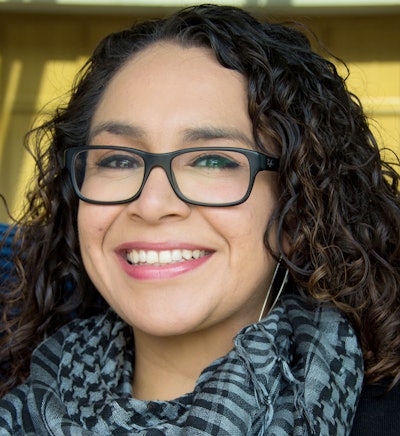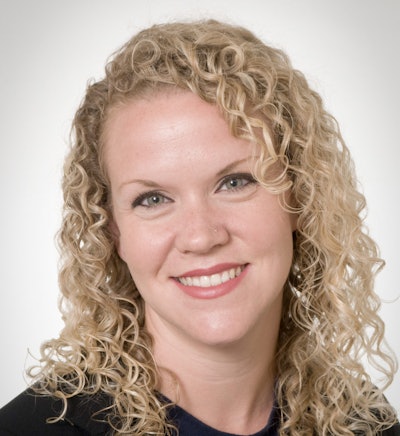Upon moving from New York to Pennsylvania due to the high cost of living, Irene Price and her husband struggled to find living wage jobs without a college degree.
Those financial challenges increased after the birth of their first child.
 Susana Contreras-Mendez
Susana Contreras-MendezWanting more stability and flexibility in her work schedule, Irene Price decided to pursue an associate degree at Northampton Community College.
Originally hesitant about being older than her “traditional-aged” peers, she soon realized her life experiences served as an asset.
“If life experiences had a college degree, I entered college with a master’s degree in life,” said Price, who is currently an undergraduate student at California State University, Fullerton (CSUF). “A lot of my essays and contributions in class are so rich because of being able to draw from just life experience and everything.”
However, finding affordable and available child care options created additional stress to her college experience.
“Child care was like a noose around our neck,” said Price. “It was something that kind of pushed us over a financial cliff because we didn’t live around family members at all. We were kind of on our own. For me, it was the biggest hurdle.”
Though Northampton offered grants for child care and on-campus support, Price was still required to pay out-of-pocket fees until her application was approved. Additionally, child care services were not offered over spring break and the summer.
Those issues continued when Price transferred to Golden West College after her family relocated to California. Looking to enroll in a child care program, she was instead put on a long wait list.
“Sometimes the resources are there but they are not ample enough,” said Price. “And maybe that speaks to more of a need on a macro level, where there needs to be more funding or more availability for child care.”
Using first-hand experiences, the Institute for Women’s Policy Research (IWPR) released a new report to highlight the ongoing challenges faced by student-parents and provide recommendations for institutions to help address their needs.
“We want to make sure that the voices of student-parents are at the forefront of our research and our work and part of the conversation to drive these policy solutions,”” said Susana Contreras-Mendez, research associate at IWPR and co-author of the report.
Within six years, first-time enrolled student-parents are twice as likely to leave college before graduating compared to their peers without children, the research found.
Among the population, two-thirds of community college student-parents, 56% of students with infants and 54% of single parents leave college without a degree or certificate. Additionally, based on racial demographics, Black student fathers are most likely to leave without finishing a degree or return as opposed to other students with or without children, according to the report.
 Lindsey Reichlin Cruse
Lindsey Reichlin Cruse“The student-parent population is not monolithic,” said Contreras-Mendez. “The student-parent experience looks different in different regions amongst different student demographics. And the most important thing that policymakers can do is listen to your students. Listen to what student-parents need in that moment.”
Drop-out rates can be associated with a number of factors including “time poverty.” A lack of affordable child care, flexible work hours and limited transportation options can interfere with their coursework.
Compared to those of “traditional” college age, student-parents face different financial demands to meet their families’ needs including child support, caretaker expenses and mortgage payments.
Though available federal aid or scholarships can provide some financial assistance, there are often limitations. For example, many scholarships mandate community service participation. Seeing those requirements discouraged Price from applying as she was unable to fit additional activities into her schedule.
Trauma and life experiences such as addiction, mental health, homelessness and domestic violence can also impede on degree completion.
Additionally, at the institutional level, many student-parents are not provided with guidance to navigate their degree to avoid taking unnecessary classes.
To address these issues, the report suggested that institutions should prioritize offering affordable and accessible child care options, develop spaces and policies that acknowledge student-parents and account for scheduling and flexibility needs within course participation and attendance requirements.
“We don’t talk enough about how important having a diverse student body is to the richness of the campus community…,” said Lindsey Reichlin Cruse, study director at IWPR and co-author of the report. “[Student-parents] are acutely aware of how important it is for their campus leaders, staff and faculty to acknowledge that more. Not just in terms of building a family friendly environment but also intentionally designing policies and practices that work for students like them.”
Despite facing a number of obstacles, Price has enjoyed her college experience.
She is now working towards completing her bachelor’s degree at CSUF. With a tentative graduation date scheduled for spring 2022, she plans to apply to graduate degree programs in social work.
“There is just an overabundance of amazing support of everything that is possible to achieve at any age,” said Price. “It is just very empowering to me. I see my graduation date looming on the horizon. When I do that, it takes me back to when I left my kids with my husband, rushing to the community college in Pennsylvania to take my assessments. It has been quite a journey.”
Sarah Wood can be reached at [email protected].


















